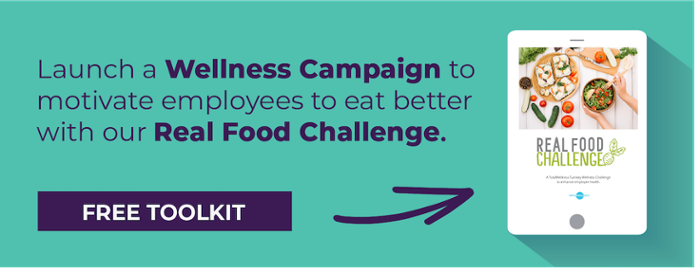It seems like every day there’s talk about a new diet that promises to change your life and body forever. While many trendy diets might help you shed a few pounds, the truth is that most of them aren’t sustainable – which is why they tend to fail. These types of diets often tell you what you can and cannot eat, and make everyday meals a bit more challenging. Plus, trendy diets don’t lead to life-long healthy habits.

Rather than trying a new diet fad every few months, it’s best to stick with a balanced diet. In fact, one of the healthiest and easiest diets to maintain is a balanced one. A balanced diet means healthy portion control, moderation, and essential nutrient intake. A balanced diet will fuel you rather than restrict you.
One of the reasons why focusing on a balanced diet is such a great choice is because it helps you develop a healthy relationship with food. It’s not about creating a restrictive meal plan or skipping out on a friend’s BBQ, it’s about learning how to properly fuel your body with the food it needs – without having to change your entire lifestyle.
Below are seven simple and helpful tips for maintaining a balanced diet. These are life-long, healthy habits that can help improve your health and wellness.
#1 Don’t deprive yourself
It’s important to learn that food is not your enemy. Having an unhealthy relationship with food can sabotage your overall health and wellness. When maintaining a balanced diet, it’s perfectly okay (and encouraged!) to enjoy your favorite foods in moderation. If you’re deeply craving a burger at your friend’s cookout, have a burger! Just be sure to make healthier choices throughout the day when you’re planning on indulging a bit. For example, load your plate with fresh fruit and veggies alongside your burger. If you deprive yourself of your favorite foods, you’ll eventually lose steam and give up on a healthy diet altogether.
#2 Watch your portions
Portion control is an essential part of any healthy diet. Overeating (even if it’s healthy food!) can lead to weight gain and other health consequences. Portion control is especially important when dining out. Many restaurants serve much more food than you need to eat to feel satisfied. Try asking for a to-go box as soon as your food is delivered, and immediately box up half of your meal to take home. You can also practice healthy portion control by measuring and packing your lunches and snacks in containers. This takes the temptation away from overeating.
#3 Stay mindful
Learning to eat mindfully is an essential step in maintaining a balanced diet. Mindful eating is the practice of eating with intention and enjoying the experience of eating. Eating mindfully will help prevent you from overeating, teach you to recognize when you’re full, and make eating more satisfying. Some tactics to master mindful eating include:
- Eating slowly
- Listening to your body
- Creating a healthy eating environment
- Using a food journal
Check out this blog post for an in-depth look at mindful eating!
#4 Limit processed foods
While it’s okay to indulge in a favorite treat every once in a while, a balanced diet will contain very small amounts of heavily processed foods. Foods like chicken nuggets, chips, frozen pizza, and snack cakes contain an abundance of added sugars, fat, calories, and chemicals – along with very little to no nutritional value. These types of foods can cause your blood sugar to spike and leave you feeling groggy. Heavily processed foods are also linked to a higher risk of chronic illness, including type 2 diabetes, obesity, cancer, and heart disease. A balanced diet is rich in real foods like veggies, fruits, whole-grains, lean protein, and healthy fats.
#5 Focus on produce
Maintaining a balanced diet is easy if you make fresh produce the focal point of most meals. Learn some new recipes that feature a variety of vegetables and fruit. Make sure at every meal contains at least one and a half servings of vegetables. Along with some lean protein, healthy fats, and whole-grains, you’ll have yourself a well-balanced meal!
PS. Check out this blog post for some sneaky ways to eat more veggies!
#6 Prepare your own meals
Cooking your own meals is an excellent way to ensure a balanced diet. When you prepare your own meals, you’ll be aware of every ingredient that is used and can better control your portions. You’ll naturally eat fewer calories while also avoiding unhealthy additives of many fast food and takeout meals.
#7 Read labels
Learning to read nutrition and ingredient labels is an excellent way to keep track of what you’re eating. Both are excellent tools to assist you while shopping or preparing meals. Many times, foods advertised as “healthy” contain a lot of added sugars and chemicals. If you want to maintain a balanced diet, it’s important to be aware of the ingredients in the food you are eating so that you can make better nutritional choices.
At the end of the day, a healthy diet is all about balance. Rather than falling into the cycle of starting a new trendy diet every couple of months, adapting some long-term healthy habits is the best way to truly maintain a healthy diet. Incorporate some of the above tips into your everyday routine to eat a more balanced diet!
What other tips do you have for maintaining a balanced diet? Feel free to share in the comment section below!
Like this blog post? Share it with your employees or co-workers with this printable version of the blog!
Image created by Freepik



